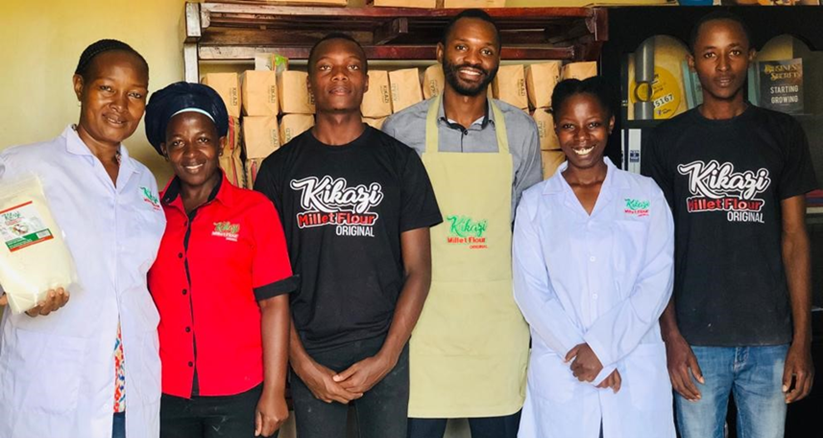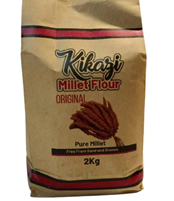Type 2 Diabetes Mellitus (T2D) is considered one of the fastest-growing diseases[i]. Multiple research studies show a link between nutrition and diseases, both as preventive and management measures[ii]. Millet, widely grown in Uganda, is one of the cereal plants identified to possess such power. Despite this, an estimated 716,000 adults in Uganda were reported to have diabetes in 2021.

The Trust’s Women Creating Wealth Team onsite at Kikazi Agri Products with CEO Grace Akatuha’s three of her employees
Grace Akatuha, the founder of Kikazi Agri Products, recognised the potency of millet and was driven to commence the production, processing, and selling of millet-based products in 2019. The motivation behind her venture stems from a personal connection – her mother’s diabetes, compelling her to provide a healthy and hygienic alternative for people with compromised immunity. “In my family, we cultivate and process millet, and learning that this was a good food for diabetics led me to want to produce it on a larger scale” explains Grace.
Kikazi operates in Uganda, specifically sourcing millet grains from farmers in Western Uganda. The company produces high-quality millet flour manually processed into 1, 2, and 5-kilo sizes, targeting Ugandan supermarkets. Additionally, Kikazi serves clients in Dubai, Kenya, and London through an online store, Owino Supermarket. However, Grace faced hurdles in market entry, from the high cost of branding and packaging to negative perceptions about local products. This had a negative impact on her access to markets and, invariably, revenue.
In the quest for growth and a community to support her, she joined the African Women in Agribusiness Network (AWAIN) in 2022. It was from here that she learned the need to expand her network and improve herself. “So, when the WCW programme came my way, I saw an opportunity to learn, better market my products and link up with other business owners.”
The programme offered Grace a self-paced and convenient learning experience tailored to the challenges faced by entrepreneurs. She has also been assigned a coach who provides technical support to strengthen her business structures.
“I realised that I need to understand the figures in my business because it is somewhat at the heart of business management. And though one may not be an accountant, there is a need to learn essentials to be able to develop and manage my financial statements. I never had a financial statement, and so I had to develop it. But this was after struggling within myself to do it or not to do it. Until the regional workshop, we were challenged by a fellow participant from South Africa who urged us to take on the challenges or we would remain the way we are and be too comfortable, thus there will be no growth for us” – Grace Akatuha
Since joining the programme, Grace’s business has undergone significant improvements. She is learning the importance of delegation, enabling her to better manage her time and make decisions strategically. By developing detailed records and financial statements and identifying ways to reduce costs, Kikazi Agri Products doubled its monthly production from 1 to 2 tons within six months of the programme. Akatuha also expanded her team, hiring 3 full-time staff and 2 interns, and increased the frequency of production and supply. Additionally, she developed a pitch deck, enhancing her ability to attract potential investors.
Kikazi Agri Products is a true testimony of how wealth in the hands of women can contribute to effective family and community development. Today, the company actively engages in corporate social responsibility activities. In 2023, Kikazi Agri Products supported the Annual Muslim Run, a fundraiser to build a babies’ home in the community. The company has also supported Kisoba League where she donated several kilos of millet flour to young footballers participating in the league and received an award for her support. This support across faiths is integral to the fabric of the community, driving social cohesion and further demonstrating the integral role female entrepreneurs play in community development. Additionally, Kikazi now employs young students from the nearby university as interns who are gaining experience whilst earning a stipend for services rendered.
Grace Akatuha’s journey with the programme showcases the transformative impact of tailored entrepreneurial support and the ripple effect on communities. From overcoming market challenges to implementing strategic business improvements, her story reflects the positive outcomes achievable through the fostering of women’s economic empowerment. Kikazi Agri Products not only contributes to a healthy society and the local economy but also actively engages in initiatives that uplift the community, underlining the broader societal impact of women-led businesses.

Photo of Kikazi millet flour captured on the website of Owino Supermarket, an African supermarket located in London, United Kingdom.
References










 The Trust supports and mobilises civil society networks on issues of ending child marriage, ending violence against children, ending female genital mutilation and promoting children’s rights, to carry out advocacy and action across Africa. Special focus is placed on Malawi, Mozambique, Tanzania and Zambia where child marriage continues to be a problem largely driven by poverty, gender inequality, harmful traditional practices, conflict, low levels of literacy, limited opportunities for girls and weak or non-existent protective and preventive legal frameworks.
The Trust supports and mobilises civil society networks on issues of ending child marriage, ending violence against children, ending female genital mutilation and promoting children’s rights, to carry out advocacy and action across Africa. Special focus is placed on Malawi, Mozambique, Tanzania and Zambia where child marriage continues to be a problem largely driven by poverty, gender inequality, harmful traditional practices, conflict, low levels of literacy, limited opportunities for girls and weak or non-existent protective and preventive legal frameworks.




 Education is a fundamental right for all children, which is also a vehicle for social, economic and political transformation in communities, countries and the African continent at large. Recent studies indicate a lack of progress in some of the critical commitments aimed at improving education quality, access, retention and achievement, particularly for girls. In most African countries, girls may face barriers to learning, especially when they reach post-primary levels of education. By implementing multi-dimensional approaches to education which includes core education, personal development, life skills and economic competencies, the Trust partners with funding partners, governments, civil societies and the private sector to improve education access.
Education is a fundamental right for all children, which is also a vehicle for social, economic and political transformation in communities, countries and the African continent at large. Recent studies indicate a lack of progress in some of the critical commitments aimed at improving education quality, access, retention and achievement, particularly for girls. In most African countries, girls may face barriers to learning, especially when they reach post-primary levels of education. By implementing multi-dimensional approaches to education which includes core education, personal development, life skills and economic competencies, the Trust partners with funding partners, governments, civil societies and the private sector to improve education access.

 The Nutrition and Reproductive, Maternal, New-born, Child and Adolescent Health and Nutrition, (RMNCAH+N) of the Children’s Rights and Development Programme aims at promoting the Global Strategy for women, children and adolescents’ health within the Sustainable Development Goals (SDG) agenda. The strategy emphasises on the importance of effective country leadership as a common factor across countries making progress in improving the health of women, children and adolescents.
The Nutrition and Reproductive, Maternal, New-born, Child and Adolescent Health and Nutrition, (RMNCAH+N) of the Children’s Rights and Development Programme aims at promoting the Global Strategy for women, children and adolescents’ health within the Sustainable Development Goals (SDG) agenda. The strategy emphasises on the importance of effective country leadership as a common factor across countries making progress in improving the health of women, children and adolescents. Through its Early Childhood Development (ECD) plan, The Trust will seek to put into action the new science and evidence Report that was presented by Lancet Series on Good and early development – the right of every child. This will be achieved by mobilising like-minded partners to contribute in the new science and evidence to reach all young children with ECD. The Trust’s goal is to be a catalyst for doing things differently, in particular, to rid fragmentation and lack of coordination across ECD sectors. In response to evidence showing the importance of political will in turning the tide against the current poor access and quality of ECD. Even before conception, starting with a mother’s health and social economic conditions, the early years of a child’s life form a fundamental foundation that determines whether a child will survive and thrive optimally.
Through its Early Childhood Development (ECD) plan, The Trust will seek to put into action the new science and evidence Report that was presented by Lancet Series on Good and early development – the right of every child. This will be achieved by mobilising like-minded partners to contribute in the new science and evidence to reach all young children with ECD. The Trust’s goal is to be a catalyst for doing things differently, in particular, to rid fragmentation and lack of coordination across ECD sectors. In response to evidence showing the importance of political will in turning the tide against the current poor access and quality of ECD. Even before conception, starting with a mother’s health and social economic conditions, the early years of a child’s life form a fundamental foundation that determines whether a child will survive and thrive optimally.